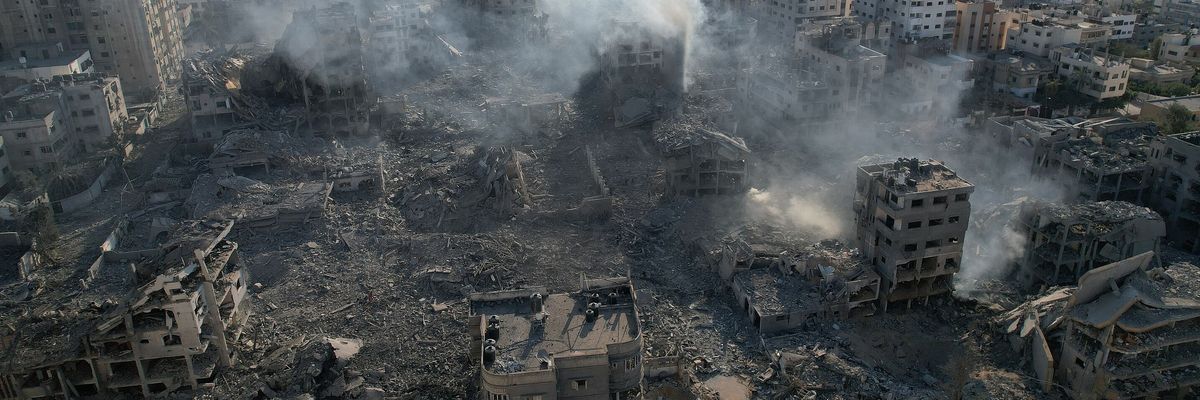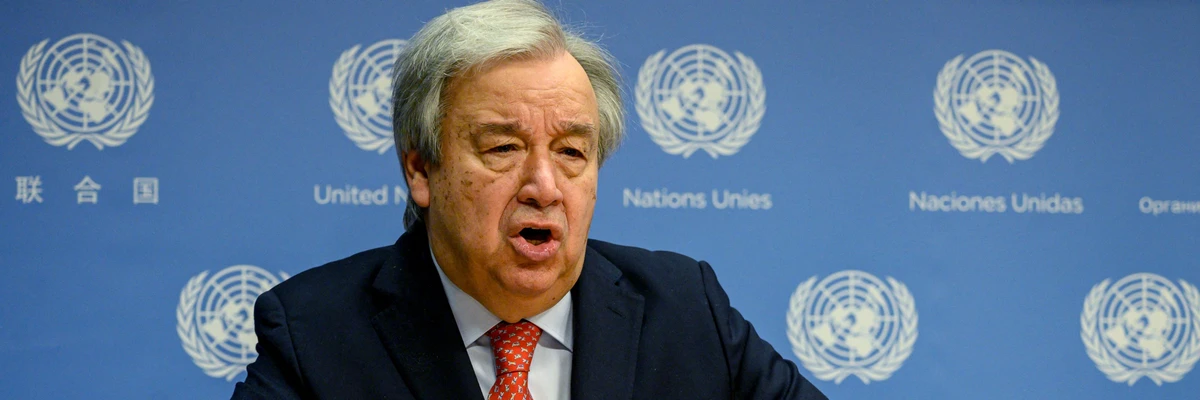World Marks Six Months of ‘Relentless Death and Destruction’ in Gaza
Original article by BRETT WILKINS republished from Common Dreams under Creative Commons (CC BY-NC-ND 3.0).

(Photo: Al Araby/Wikimedia Commons)
U.N. Secretary-General António Guterres reiterated his call for an “immediate humanitarian cease-fire, the unconditional release of all hostages, the protection of civilians, and the unimpeded delivery of humanitarian aid.”
Peace and human rights advocates on Sunday renewed calls for an immediate cease-fire in Gaza and an increase in lifesaving humanitarian aid for its starving people as the embattled enclave marked six months since the start of Israel’s genocidal retaliation for the October 7 attacks.
In six months of bombardment by air, land, and sea following the Hamas-led attacks that killed more than 1,100 people in Israel—with over 240 people taken hostage—Israeli forces have killed or maimed more than 116,000 Palestinians, including people believed to be dead and buried beneath the rubble of hundreds of thousands of bombed-out homes and other buildings. Gazans—especially children—are starving to death as Israel severely restricts the amount of aid allowed to enter the strip. Women are “burying their newborns every day” as they have nothing to feed them.
Around 90% of Gaza’s 2.3 million people have been forcibly displaced, perhaps permanently, in what many Palestinians and international observers are calling a new Nakba, the ethnic cleansing catastrophe perpetrated by Jewish militants during the establishment of the modern state of Israel in 1948. Gaza’s infrastructure has been obliterated, with reconstruction expected to cost $18.5 billion, or nearly Palestine’s entire annual gross domestic product.
“Over the last six months, the Israeli military campaign has brought relentless death and destruction to Palestinians in Gaza—with more than 32,000 people reportedly killed and more than 75,000 injured—the vast majority women and children,” United Nations Secretary-General António Guterres said during a press conference marking six months of a war in which the International Court of Justice has found that Israel is plausibly committing genocide.
“During my visit to the Rafah crossing 10 days ago, I met veteran humanitarians who told me categorically that the crisis and suffering in Gaza is unlike any they have ever seen,” Guterres continued. “Meanwhile—as I saw on my way to the Rafah crossing—long lines of trucks loaded with humanitarian aid continued to face obstacle after obstacle.”
“When the gates to aid are closed, the doors to starvation are opened,” he said. “More than half the population—over a million people—are facing catastrophic hunger. Children in Gaza today are dying for lack of food and water. This is incomprehensible, and entirely avoidable. Nothing can justify the collective punishment of the Palestinian people.”
Guterres noted the 196 humanitarian aid workers—including more than 175 U.N. personnel and members of Doctors Without Borders, the International Red Crescent, World Central Kitchen, and other organizations—who have been killed by Israeli bombs and bullets over the past six months.
“I repeat my urgent appeals for an immediate humanitarian cease-fire, the unconditional release of all hostages, the protection of civilians, and the unimpeded delivery of humanitarian aid,” Guterres said.
Demonstrators took to the streets of cities around the world to condemn Israel’s genocide and demand an immediate cease-fire.
There were also protests in cities including Tel Aviv and New York calling for the release of all Israelis and others held hostage in Gaza. New York rabbi Ellen Lippman said she wouldn’t be attending the rally because she “cannot call for the release of the hostages without an explicit demand for an immediate cease-fire and an end to the Israeli assault on Gaza.”
Left-wing Israelis held vigils outside the U.S. embassies in Jerusalem and Tel Aviv on Friday to demand an end to Washington’s military and diplomatic support for Israel’s genocide.
“The United States supplies the guns, and Israel pulls the trigger,” organizer Erez Bleicher told the crowd.
President Joe Biden in recent days has urged an immediate cease-fire, even as the U.S. continues to provide the bulk of Israel’s weapons. In a Thursday call with Israeli Prime Minister Benjamin Netanyahu, Biden “made clear the need for Israel to announce and implement a series of specific, concrete, and measurable steps to address civilian harm, humanitarian suffering, and the safety of aid workers,” the White House said in a statement. “He made clear that U.S. policy with respect to Gaza will be determined by our assessment of Israel’s immediate action on these steps.”
Israel responded by saying it would temporarily allow more aid to enter Gaza.
Original article by BRETT WILKINS republished from Common Dreams under Creative Commons (CC BY-NC-ND 3.0).

